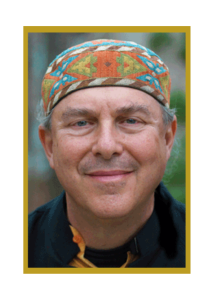
On February 27, 2001, Shabda Kahn was was appointed Pir (lineage holder) of the Sufi Ruhaniat International in the stream of the great mystic Hazrat Inayat Khan, his disciple, Murshid Samuel Lewis and his successor, Pir Moineddin Jablonski.
Shabda was born in New York City, the second child of German Jewish immigrants who fled just before the holocaust. Visiting his house in the early 70’s was like being in a European home. His parents had a close and loving circle of friends and extended family that would meet for most holiday occasions around the large dining room table now in Shabda’s home in San Rafael. Shabda has always had a gift for the mechanical and the technological, coupled with a strong sense of aesthetics. He attended McGill University in Canada and City College of New York. His mother thought he might become an architect. Instead, while living in the Bay Area, he became a musical instruments maker under the business name Sound Instruments. He received guidance from Hamza El Din and Pandit Pran Nath in making frame drums, dumbeck drums, tambouras and ektars in a small garage workshop.
While still in New York, Shabda heard “Baba” Ram Dass, who had just returned from India, give a talk on the radio. He was moved to give away everything—but not his Martin guitar—drop out and become a “seeker.” He heard Pir Vilayat Inayat Khan speak in New York, and set out to attend the June 1969 Sufi Camp in Colorado taught by Pir Vilayat. It was there that he met several of Murshid Sam Lewis’s students including Wali Ali Meyer. He met Murshid Sam in California before travelling to be with Baba Ram Dass in Franklin, New Hampshire for the summer of 1969. After that, he was inspired by the perfume of the connections with the Sufis and Murshid Sam and moved to California to be with the remarkable teacher. He was initiated by Murshid Samuel Lewis on February 16, 1970. In the Fall of 1970 Shabda traveled with Murshid for five weeks as his personal assistant on the East Coast. A month later, December 28, 1970, Shabda was staying at Murshid’s home, the Mentorgarten, the morning Murshid Sam fell down the stairs. Shabda drove Murshid to the hospital. Murshid Sam died several weeks later. Shabda received his name from Pir Vilayat Inayat Khan in the Spring of 1971.
When Murshid SAM died, Shabda became one of Pir Moineddin’s secretaries and assisted leading the Wednesday night dance meeting, eventually taking over when Moineddin could no longer lead it. As Moineddin’s condition worsened, he requested that Pir Vilayat initiate Shabda as a Sheikh. This occurred on February 5th, 1977, at the tomb of Hazrat Inayat Khan in India on the 50th Anniversary of Inayat’s passing. In October 1997, at a Sufi camp in Maui, Hawaii, Pir-o-Murshid Hidayat Inayat Khan, spiritual leader of the International Sufi Movement, initiated Shabda as a Murshid.
Shabda met his second great teacher, Pandit Pran Nath, in 1972, and began the daily practice of North Indian Classical vocal music in the Kirana style, following in the footsteps of Hazrat Inayat Khan. Pandit Pran Nath was a master vocalist and Sufi mystic. Pran Nath planted an 800-year-old oral tradition of Chisti Sufi Vocal Music in the Western World and requested that Shabda carry on the lineage teaching under the name of the Chisti Sabri School of Music. This has become an umbrella for Shabda’s vocal music teaching and Raga singing performances.
Shabda and Tamam met in 1974 when they were both in musical groups; he was guitar player and singer in the Sufi Choir and she sang in the Fairfax Street Choir. They lived together in the Marin County Sufi khankah called the Garden of Allah, where classes and events were ongoing. They married April 19, 1976, the date astrologically chosen by Pandit Pran Nath, in a ceremony performed by Pir Moineddin on a sunny day, near the top of Mount Tamalpais.
In 1969 Shabda met Joe Miller, the great American mystic who lived above the Theosophical Society in San Francisco. Joe Miller, and his wife Guin continued to be guiding lights for him and many of the Sufi family throughout Joe’s later life. For many years Shabda would leave his retail store—Dreamweaver—in San Francisco on Union Square at 6 PM, buy some flowers for Guin, stop at Mrs. Fields for cookies for Joe, and then they would all watch Monday night football and talk story.

